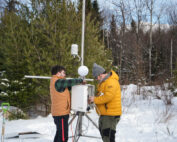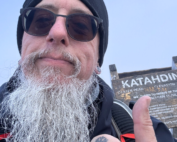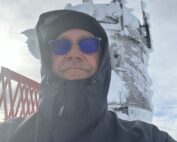My Journey as an Educator on Mount Washington
I’m Olivia Dodge, a school programs educator at the Mount Washington Observatory (MWOBS). Born and raised in New England, I’ve been visiting Mount Washington since I was a toddler. My family would go camping in Glen and would go back-to-school shopping at the Settler’s Green Outlets each summer. Additionally, we would take an annual photo together at the base of the Mount Washington Auto Road, creating almost 20 years of these photographed memories.
Over the years, our Mount Washington-obsessed family visited the summit time and time again. Each mode up the mountain, from Auto Road self-drives and van tours, to Cog railway field trips added to my fascination. I had set a goal to hike Mount Washington on foot by the time I graduated high school, and in July of 2020, my dad and I completed the challenge. A few winters later, our family made it to the winter cut-off via Snow Coach. The only mode up the mountain I had left on my personal docket was the SnowCat, or the large snow tractor MWOBS uses in the winter for observer and volunteer shift changes.
I started with MWOBS in January 2025 as part of the Lakes Region Conservation Corps (LRCC), a division of AmeriCorps based out of Holderness, NH. In February of 2025, I was presented with the opportunity to summit Mount Washington via SnowCat to experience a shift change and MWOBS culture on the summit in the winter. I was overjoyed. Each new experience, whether going in the SnowCat or visiting Waumbek Station on the Cog Railway’s winter field trips, I shared with my family. I was actively living out the job of my childhood dreams.
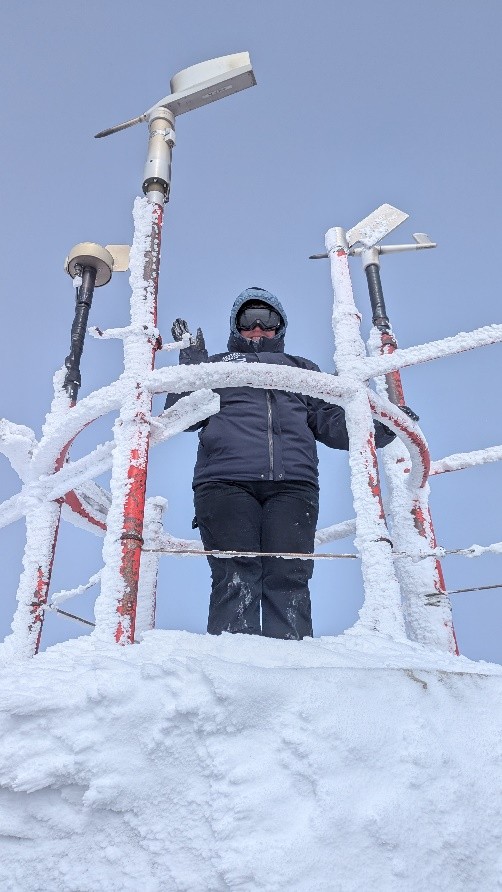
On the parapet, standing on the official highest point of New England.
However, throughout the month of April, news of federal dismissal of AmeriCorps programs began to spread. The wonderful trustees and staff of the Observatory worked quickly to create a plan to directly hire my fellow AmeriCorps school programs educator, Alexander Templeton, and myself should something occur with our division at the LRCC. The following week, we received news from the director of the LRCC, Elise Eifler, that our division had been defunded.
Yet thanks to the preparation of the MWOBS staff, our transition from AmeriCorps members to official Observatory staff went smooth. Our roles were the same as before, just under new management. Ever wondered what the education team at the Mount Washington Observatory does?
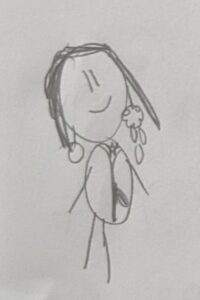
A student’s drawing of me, featuring my sun and rain earrings.
For starters, we’re tasked with presenting educational, engaging, and entertaining in-classroom material to student audiences surrounding topics of extreme weather, weather instrumentation, aerial phenomena, and natural disasters. We get to facilitate hands-on educational experiences to reinforce the presented material, encouraging students to utilize the scientific method, practice resourcefulness, and harbor creativity in their learning. Throughout the course of the winter semester (January-June), the MWOBS education team has been able to provide over 130 programs to schools throughout New Hampshire (and a few in Maine)!
From late May through early June, the Mount Washington Observatory and Cog Railway hosted 25 school groups, giving several thousand students the opportunity to visit the summit. During these field trips, students receive a tour of the MWOBS Weather Station, the chance to enjoy the Extreme Mount Washington Museum, and outside time to experience the Home of the World’s Worst Weather.
Not only do the students get the chance to learn through MWOBS, but so do we! As education team members, we have the opportunity to develop additional programs based on various topics related to weather and/or Mount Washington (including researching the topic, organizing collected information, hosting peer review of lesson materials, and model/activity development and testing). As a conservation biologist and former adventure educator, I have worked on developing programs based on topics such as the flora and fauna of Mount Washington and avalanche condition and safety protocol. Both of these programs cover the influence of weather and Mount Washington-specific conditions on the various topics.
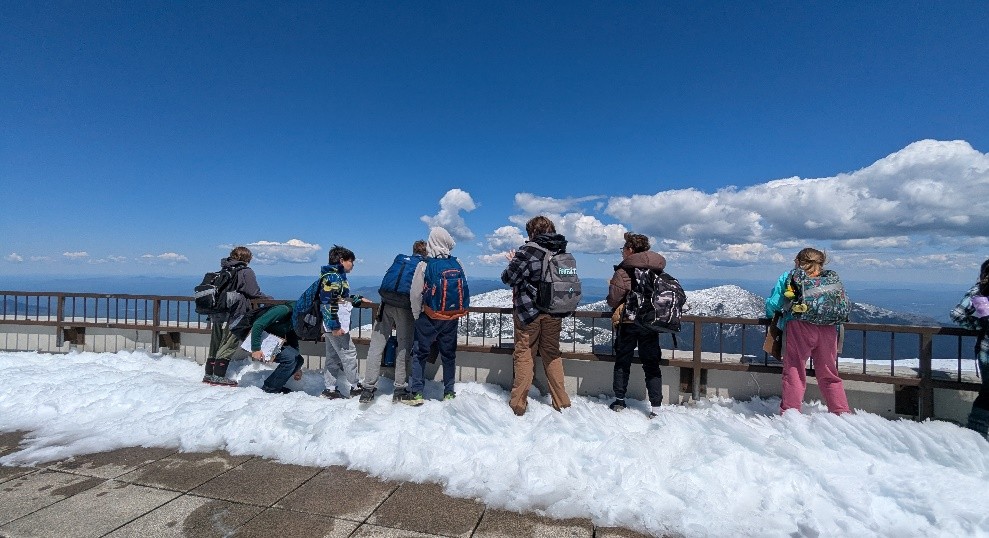
A field trip in late May, experiencing winter views with spring conditions.
Working at the Mount Washington Observatory has offered me the chance to live out little Olivia’s dream. I have had the chance to facilitate field trips for multiple schools from my grade school district, including my former elementary school. I have been able to share about the cool things the Mount Washington Observatory is doing with individuals across the state. Not only do I love this organization and its history, but I love the experiences both personally and professionally that it has provided me with.
To support education programs on the summit of Mount Washington and beyond during NH Gives, visit https://www.nhgives.org/organizations/mount-washington-observatory.
Life as a Mesonet and Information Systems Technician
Life as a Mesonet and Information Systems Technician By Colby Morris Installing an automated weather station with MWOBS Director of Technology Keith Garrett (left). The instrument I am holding is a temperature sensor.
Supporter Spotlight: Ryan Shepard
Supporter Spotlight: Ryan Shepard By Ryan Shepard and Carissa Milliman Ever since I was a kid, living in Western New York and growing up with lake effect snow, I thought harsh weather was incredibly
Supporter Spotlight: Erik Rider
Supporter Spotlight: Erik Rider By Wendy Almeida For Erik Rider, supporting Mount Washington Observatory comes from a lifelong fascination with weather and how it shapes daily life. Growing up along the Massachusetts coast, he

